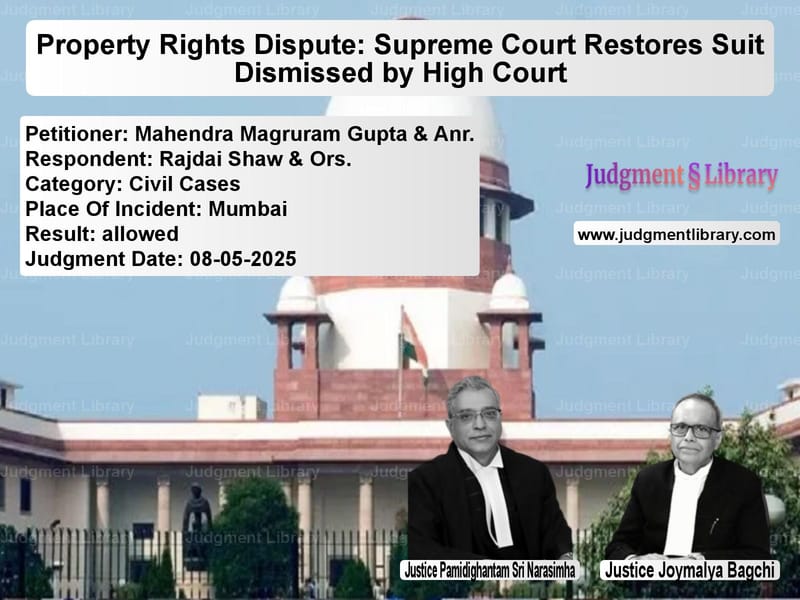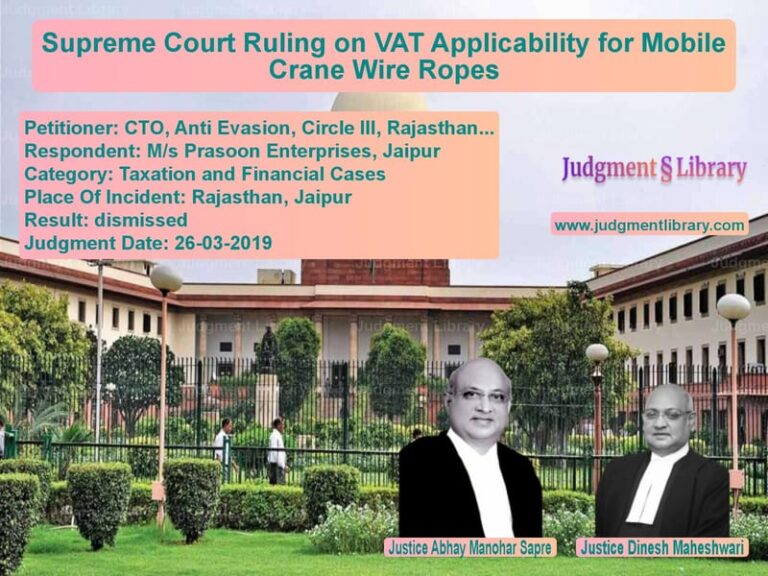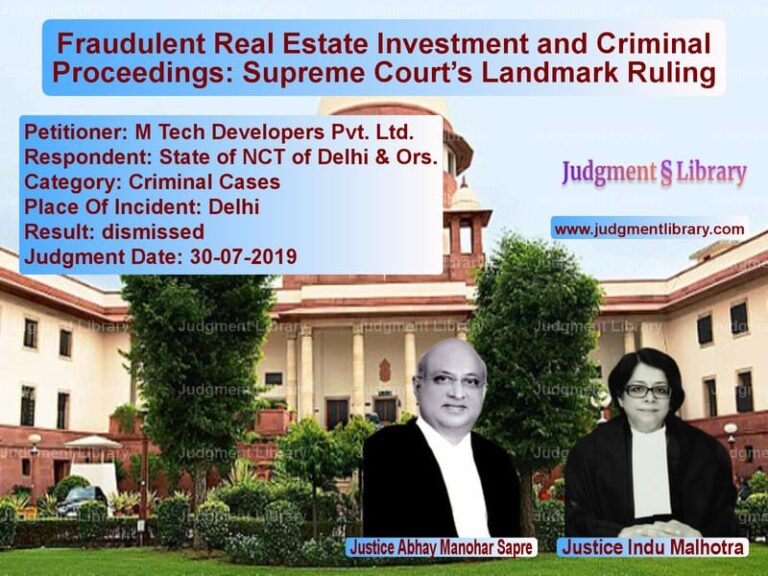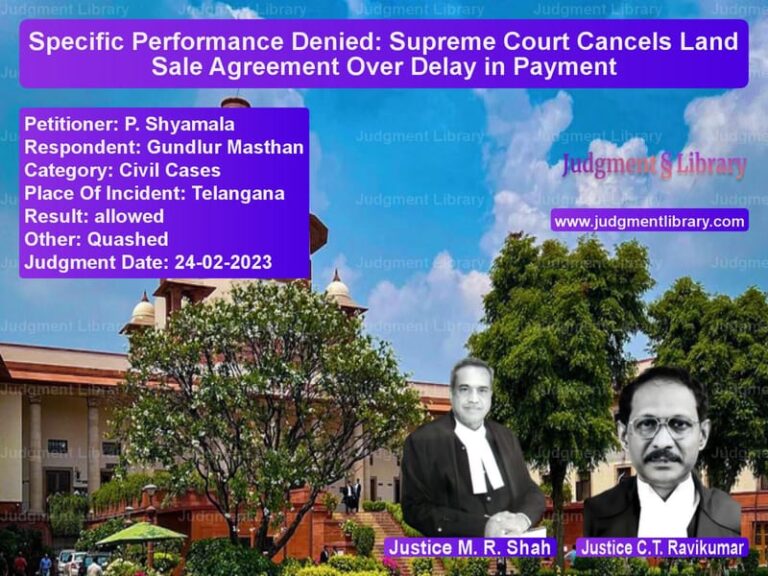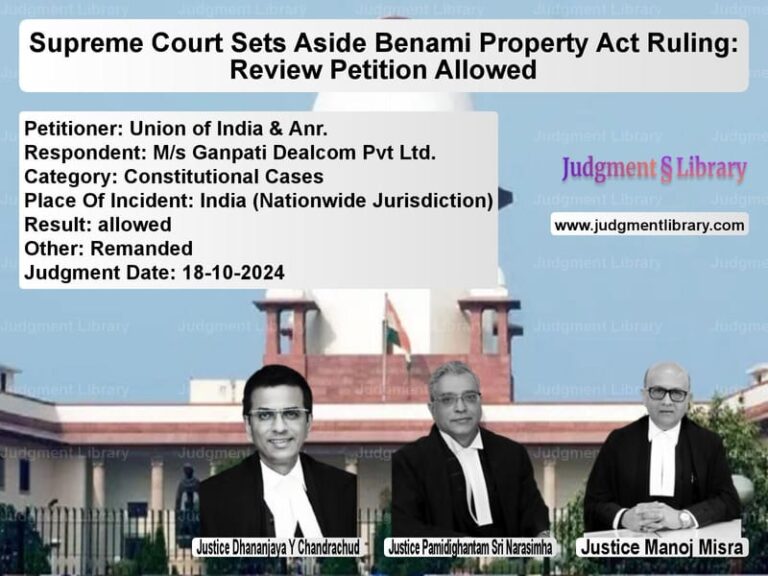Property Rights Dispute: Supreme Court Restores Suit Dismissed by High Court
In a significant ruling that underscores the importance of procedural propriety in civil litigation, the Supreme Court of India delivered a judgment on May 8, 2025, setting aside a Bombay High Court order that had effectively dismissed a property dispute suit while hearing an appeal against an interim injunction order. The case involved a complex family property dispute concerning Shop No. 5 in Bajarang Krupa Building situated at 220-222, N.M. Joshi Marg, Parel, Mumbai, and highlighted crucial procedural errors committed by the High Court while dealing with an appeal against an interim order.
The dispute had its origins in a family arrangement between three brothers – Mr. Magruram Chotanki Gupta, Mr. Deepnarayan Chotanki Gupta, and Mr. Baburam Chotanki Gupta – who were co-tenants of the suit property. The appellants, Mahendra Magruram Gupta and another, were descendants of Mr. Magruram Chotanki Gupta, while respondent no. 1, Rajdai Shaw, was the descendant of Mr. Deepnarayan Chotanki Gupta. The appellants based their claim on two key documents: a notarized affidavit dated February 22, 1990, through which Mr. Deepnarayan Chotanki Gupta (respondent no. 1’s predecessor) allegedly transferred his rights in the tenanted premises to Mr. Magruram Chotanki Gupta, and a declaration dated April 18, 1998, signed by Smt. Antadevi (Mr. Deepnarayan’s widow) relinquishing her rights in the suit property in favor of appellant no. 1.
Relying on these documents, the appellants filed a suit for declaration and permanent injunction before the Bombay City Civil Court, seeking several reliefs including declarations that the agreements dated February 22, 1990, and April 18, 1998, were valid, legal, and binding upon the defendants, and injunctions restraining the defendants from dispossessing them from the suit premises or creating third-party interests in the property.
The Trial Court dismissed the appellants’ application for interim relief of temporary injunction on December 21, 2012. Aggrieved by this order, the appellants approached the Bombay High Court in appeal. However, what should have been a routine appeal against an interim order turned into a judicial anomaly when the High Court, while hearing the appeal against the refusal of interim injunction, proceeded to virtually dismiss the entire suit itself.
The High Court’s Controversial Order
The Supreme Court carefully examined the High Court’s order and found several fundamental errors in its approach. The High Court had initially recorded a significant concession made by respondent no. 1’s counsel, who stated that “respondent No.1 shall not dispossess the appellants/plaintiffs and shall not create any third party right or interest in the suit shop except under order or decree of this Court.” This statement should have normally led to the grant of interim protection to the appellants.
However, in what the Supreme Court termed as a “complete non sequitur” (a conclusion that does not logically follow from the premises), the High Court made an extraordinary leap in reasoning. Despite recording the respondent’s concession that they would not dispossess the appellants without a court order, the High Court declared that “Upon that statement the suit with regard to the protection of possession becomes infructuous as the reliefs granted in terms of prayers (c), (d) and (e) in the suit.”
The High Court then proceeded to examine the substantive merits of the appellants’ case regarding the two agreements dated February 22, 1990, and April 18, 1998. Noting that these agreements were unregistered, the High Court invoked Section 49 of the Registration Act, 1908, and concluded that “No decree or order in that behalf can be granted. The suit as filed would require the Court to dismiss it with regard to the reliefs under prayers (a) & (b).”
In its final order, the High Court set aside the Trial Court’s order dismissing the interim injunction application but then, invoking Order 41 Rule 33 of the Civil Procedure Code, passed a sweeping order: “The suit in terms of prayers (a) & (b) stands dismissed. Upon the statement of the Advocate for defendant No.1/respondent No.1 that respondent No.1 shall not dispossess the plaintiffs except under the order or decree of this Court in Suit No.443 of 2013, the suit in terms of prayers (c), (d) & (e) stands decreed in terms of the statement which is accepted by this Court, as defendant No.1 in the suit has followed due legal process.”
The Supreme Court’s Critique
The Supreme Court, in its judgment delivered by Justice Pamidighantam Sri Narasimha with Justice Joymalya Bagchi concurring, strongly criticized the High Court’s approach, describing it as “completely illegal and unsustainable in law.” The Court identified multiple fundamental errors in the High Court’s reasoning and procedure.
First, the Court emphasized the limited scope of an appeal against an interim order. The Supreme Court pointed out that “There was no occasion for the High Court to consider the two documents while deciding an application for interim relief. The legality, validity, and admissibility of those documents were matters to be considered in the suit during trial.” This observation underscores the fundamental principle that interim proceedings are meant to preserve the status quo until the final determination of rights in the main suit, and courts should generally avoid making conclusive findings on substantive issues at the interim stage.
Second, the Court highlighted the procedural irregularity of the High Court dismissing substantial portions of the suit while hearing an appeal against an interim order. The Supreme Court categorically stated that “In an appeal to the High Court against the order of the Trial Court refusing to grant injunction pending disposal of the suit, the High Court could not have dismissed the substantive portion of the suit itself and direct that the remaining part of the suit be agitated in a suit filed by the defendant.”
The Supreme Court also noted the inherent contradiction in the High Court’s reasoning. While the High Court had initially acknowledged that the respondent’s concession warranted protection of the appellants’ possession, it strangely concluded that this very concession made the suit infructuous. The Court found this reasoning illogical and contrary to established legal principles.
Legal Principles Reaffirmed
This judgment reaffirms several crucial principles of civil procedure and interim relief jurisprudence. The Supreme Court emphasized that the purpose of interim injunction proceedings is to maintain the status quo and prevent irreparable injury until the rights of the parties are finally determined in the suit. Courts hearing interim applications should refrain from making conclusive determinations on substantive issues that are required to be decided in the main trial.
The judgment also reinforces the principle that appeals against interim orders have a limited scope and should not be used as a vehicle for deciding the entire suit. The High Court’s invocation of Order 41 Rule 33 of the CPC to dismiss substantial portions of the suit was found to be completely misplaced, as this provision is meant to enable appellate courts to do complete justice between parties, not to bypass the normal trial process.
Furthermore, the Supreme Court’s ruling underscores that issues of document validity, registration requirements, and admissibility are matters to be properly examined during trial with full opportunity to both parties to lead evidence and make submissions. Making conclusive findings on such issues at the interim stage deprives parties of their right to a full and fair trial.
The Supreme Court’s Directions
Allowing the appeals, the Supreme Court set aside the High Court’s judgment and order dated August 14, 2013, and restored the suit filed by the appellants (Civil Suit (L) No. 2217 of 2012) before the Bombay City Civil Court to its original number. The Court also granted interim protection to the appellants by directing that “Pending disposal of this suit, there shall be a direction restraining the respondents-defendants from dispossessing the appellants.”
Importantly, the Supreme Court clarified that “we have not expressed any opinion on the merits of the matter,” thus leaving all substantive issues open for determination by the Trial Court in accordance with law.
Broader Implications
This judgment serves as an important reminder to courts at all levels about the proper scope and limitations of interim proceedings. It reinforces the distinction between interim relief and final determination of rights, a distinction that is fundamental to the administration of civil justice.
The ruling also highlights the importance of procedural fairness and the right to a full trial. By setting aside the High Court’s order that had effectively short-circuited the normal trial process, the Supreme Court has reaffirmed the principle that substantive rights should not be decided in summary proceedings unless specifically permitted by law.
For litigants, this judgment underscores that interim proceedings, while important for protecting their interests during the pendency of litigation, are not substitutes for a full trial. Parties have the right to have their substantive claims properly adjudicated through the complete trial process with all its procedural safeguards.
The Supreme Court’s intervention in this case demonstrates its role as the guardian of procedural propriety and its commitment to ensuring that courts at all levels adhere to established legal principles and procedures. By correcting the High Court’s errors, the Supreme Court has not only provided relief to the appellants in this specific case but has also reinforced important principles that guide the administration of civil justice in India.
Petitioner Name: Mahendra Magruram Gupta & Anr..Respondent Name: Rajdai Shaw & Ors..Judgment By: Justice Pamidighantam Sri Narasimha, Justice Joymalya Bagchi.Place Of Incident: Mumbai.Judgment Date: 08-05-2025.Result: allowed.
Don’t miss out on the full details! Download the complete judgment in PDF format below and gain valuable insights instantly!
Download Judgment: mahendra-magruram-gu-vs-rajdai-shaw-&-ors.-supreme-court-of-india-judgment-dated-08-05-2025.pdf
Directly Download Judgment: Directly download this Judgment
See all petitions in Property Disputes
See all petitions in Contract Disputes
See all petitions in Landlord-Tenant Disputes
See all petitions in Specific Performance
See all petitions in Damages and Compensation
See all petitions in Judgment by P.S. Narasimha
See all petitions in Judgment by Joymalya Bagchi
See all petitions in allowed
See all petitions in supreme court of India judgments May 2025
See all petitions in 2025 judgments
See all posts in Civil Cases Category
See all allowed petitions in Civil Cases Category
See all Dismissed petitions in Civil Cases Category
See all partially allowed petitions in Civil Cases Category

